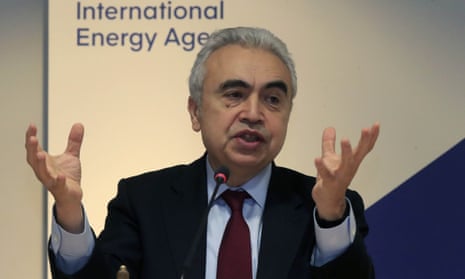The head of the International Energy Agency has accused Russia of orchestrating Europe’s deepening energy crisis at a time of heightened geopolitical tensions by withholding up to a third of its gas exports.
Fatih Birol, the executive director of the IEA, directly blamed Russia’s behaviour for the record-high energy market prices in Europe this winter that threaten to upend large parts of the European economy and plunge millions into a cost of living crisis.
He said the historic low gas storage levels across Europe were largely due to Russia’s state-owned gas company, Gazprom, which has sent about 25% less gas than usual to Europe over recent months despite a surge in demand after 2020’s economic slump.
“We believe there are strong elements of tightness in the European gas market due to Russia’s behaviour,” Birol said reporters on Wednesday. “I would note that today’s low Russian gas flows to Europe coincide with heightened geopolitical tensions over Ukraine.”
The IEA’s most damning criticism of Russia’s energy policy to date has emerged after the Kremlin downplayed hopes of diplomatic solutions for the ongoing Ukraine crisis on Tuesday, before a meeting in Brussels between Russia and Nato’s 30 member states.
This week Russian forces deployed along the Ukraine border conducted a live-fire military exercise involving 3,000 troops and tanks, in a clear rejection of US demands for a de-escalation in the region.
At the same time, the world’s biggest supplier of gas has opted to keep a lid on gas exports to Europe where market prices have surpassed the all-time highs set in September to reach a new record last month.
Analysts estimate that Europe’s gas prices could fall by half if Russia agreed to increase its exports by 20%. Gazprom has claimed it is meeting all its contracted exports to European companies.
“The current storage deficit in the European Union is largely due to Gazprom,” Birol said. “The low levels of storage in company’s EU-based facilities account for half of the EU storage deficit although Gazprom facilities only constitute 10% of the EU’s total storage capacity.”
Chris O’Shea, the head of the UK’s largest home energy supplier, British Gas, warned that prices were likely to remain high for at least another two years, based on the current outlook for global energy markets and the UK’s ongoing reliance on fossil fuels.
“There’s no reason to think that energy prices will come down any soon — the market suggests that high prices will be here for the next 18 months to two years,” he told the BBC on Wednesday morning.
“As we move towards net zero, gas is a big transition fuel, so as you turn off coal-fired power stations in other countries, there’s more demand for gas, but there isn’t an abundance of gas that you can just turn on quickly.”
The prediction could prove devastating for UK households, which face a cost of living crisis after a record increase in energy bills this winter due to the global gas crisis. The rising cost of fossil fuels has also led to record pump prices and may stoke rising inflation across the economy in the months ahead.
O’Shea said it was “inconceivable” for the government and energy suppliers to fail to take action to protect households from rising energy bills, which could reach an average of £2,000 by April.
He repeated the industry’s calls for the government to remove the 5% VAT rate from energy bills, shift green levies into general taxation and defer charges taken via energy bills to cover the cost of a string of recent supplier collapses.
